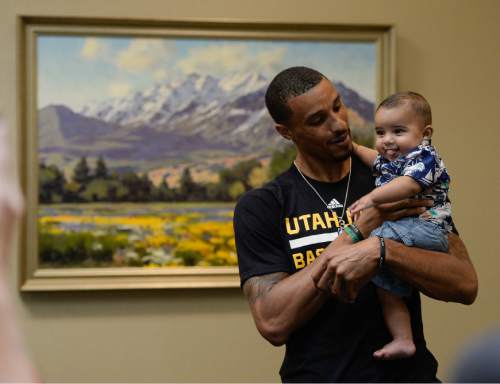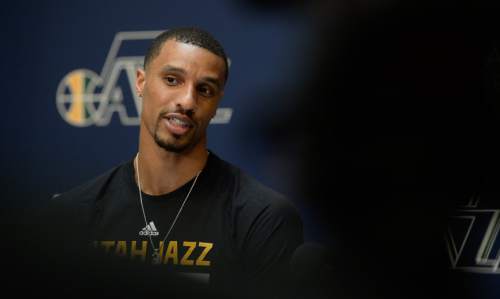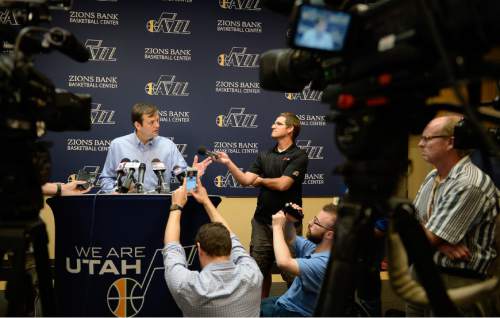This is an archived article that was published on sltrib.com in 2016, and information in the article may be outdated. It is provided only for personal research purposes and may not be reprinted.
With the NBA's preseason less than two weeks away and social unrest rippling through the nation after a series of police shootings of African-Americans, the NBA is taking steps in advance to deal with potential protests from its players.
NBA Commissioner Adam Silver and union director Michele Roberts have sent letters to each player in the league in an attempt to open dialogue, encourage action and to find a way for players to make their voices heard.
"Over the last several weeks, many of you have reached out to us, both to solicit advice on how you can get involved to create a positive change, and to ask for support as you develop your own efforts," said the letter, which was obtained by ESPN.com and other media outlets on Wednesday night. "The league and the Players Association, working together, have begun developing substantive ways for us to come together and take meaningful action."
Recent weeks have been dominated by media coverage of San Francisco 49ers quarterback Colin Kaepernick and other NFL players who have been kneeling or sitting during the playing of the national anthem in an effort to raise awareness about perceived injustice toward African-Americans.
This week alone, the country has been rocked with the fatal shooting of Terence Crutcher, an unarmed African-American male, by a police officer in Tulsa, Okla.. Violence erupted in Charlotte on Tuesday and Wednesday after police shot and killed Keith Scott, another African American male. Police say Scott was armed; protesters say he was not.
Charlotte was to host the 2017 All-Star game before it was relocated to New Orleans in the wake of North Carolina passing an anti-LGBT and transgender bill. Tulsa is less than two hours from Oklahoma City, Okla., where the Thunder play.
The NBA has long encouraged social awareness among its players. Still, league rules require that players stand for the national anthem — the rule is fallout from 1996, when NBA suspended then-Denver guard Mahmoud Abdul-Rauf for his refusal to stand.
According to ESPN.com, the league has no plans to change its rules for the upcoming season regarding the anthem. Before a WNBA playoff game on Wednesday, the entire Indiana Fever team knelt during the national anthem along with two players from the Phoenix Mercury.
"Well, we thought it was important to have a voice about something greater than basketball," said Indiana's Tamika Catchings, the longtime WNBA star who played her final game before retirement.
Silver, during his tenure as commissioner, has worked with the players who express themselves on social issues. When players protested the death of Eric Garner during the 2014 season by wearing "I can't breathe" T-shirts while warming up before games, the league didn't fine them. When former Los Angeles Clippers owner Donald Sterling was caught on audio making disparaging remarks toward African-Americans, Silver swiftly forced him to sell the team.
With training camps opening next week, players around the league are starting to speak out. Oklahoma City guard Russell Westbrook posted a lengthy message on Instagram expressing his anger about the Crutcher incident. Golden State Warriors head coach Steve Kerr told ESPN's The Undefeated on Wednesday that Americans should be "disgusted" by the Tulsa shooting.
"I'm all for people speaking out against injustice," said Kerr, who was 18 when his father — the president of American University in Beirut — was murdered. "Whatever form that takes, if it's non-violent and it leads to conversation, then I think that's a good thing."
"Our players have the opportunity and ability to express themselves as people and we respect that above all," Thunder general manager Sam Presti said Wednesday.
Incoming Jazz point guard George Hill said recently that he has been shaken by recent events.
"I definitely think about it," Hill told The Salt Lake Tribune. "As an athlete, as an African-American growing up in a tough neighborhood, you have your black-on-black crimes and your cop brutality situations, and no-justice and things like that; it gets irritating after awhile. But, that's kind of like the world we've been living in, and when I say it to a lot of the youth all the time when I speak, we can't expect someone else to respect us if we don't respect ourselves. Like I said, we can get mad all we want to, but it all starts with us. We have to come together as a whole, and love one another first before we can ask someone else to love us."
The Associated Press contributed to this report.
twitter: @tjonessltrib







